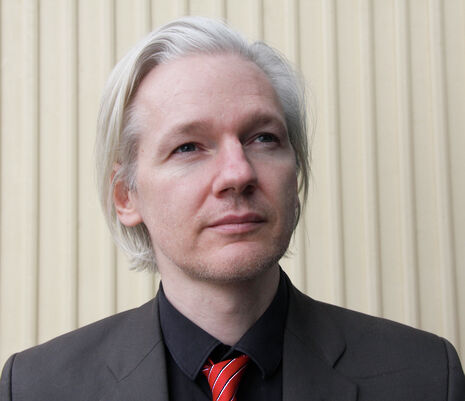Julian Assange at the Union (sort of)
The Wikileaks founder will speak via videolink from his room in the Ecuadorian Embassy

Julian Assange is due to speak at the Cambridge Union via video-link on 27 November in his first public Q & A session since seeking political asylum in the Ecuadorian Embassy last August.
Mr Assange currently faces rape and sexual assualt questioning in Sweden, and has been living in the Embassy after a ruling declared that he should be extradited to Sweden. He last spoke at the Union 18 months ago, in March 2011, less than a month before the decision regarding his extradition was made.
The Union released a statement on Monday evening about their decision to offer the Wikileaks founder a platform to speak:
“One of most recognisable figures in recent years, Julian Assange is the founder and editor-in-chief of whistle-blowing organisation Wikileaks. Since 2006 he has overseen the release of millions of secret files, including the unprecedented disclosure of 250,000 confidential US diplomatic cables.
"More recently he has sought refuge in the Ecuadorian embassy in London in order to avoid extradition to Sweden.”
The Union also clarified that the event will only be open to members, and that tickets will be released closer to the event.
The CUSU Women's Campaign have already created a Facebook event to discuss organising a protest against the event and “to organise exactly what CUSU Women's Campaign are going to do against this”. A meeting open to all “self-defining women” will be held on Thursday to discuss what steps should be taken.
The session with Mr Assange is scheduled for the day after George Galloway, who sparked controversy in August by claiming that the allegations against Mr Assange's constituted “bad sexual etiquette”, is due to speak at Clare Politics. In October, the National Union of Students (NUS) passed a 'No Platform' motion banning Mr Galloway from speaking at NUS events as a result of his comments.
At the time, the Secretary of Clare Politics told Varsity:
“We don't feel that banning people who express controversial views is necessarily the best way forward; if you keep that person from speaking, you take away their accountability.”
The Wilberforce Society also extended an invitation to Mr Galloway to speak at a seminar, similarly ignoring the NUS decision.
The plan to protest echoes the reaction to Dominique Strauss-Kahn's visit in March this year, when up to 200 students demonstrated against the former head of the IMF on his arrival at the Union. Strauss-Kahn, who resigned in May 2011 following allegations that he had sexually assaulted a hotel maid in New York, entered the building by a side door to avoid an encounter with protesters, and addressed the Union flanked on either side by security guards.
The protest led to two arrests, one for the assault of a police officer, and another for breach of the peace. A petition entitled “Disinvite DSK” gathered 700 signatures, but failed to persuade the Union to retract the invitation.
Ruth Graham, the then Women's Officer, claimed at the time that the demonstrators were "concerned about legitimising Strauss-Kahn by allowing him such a prestigious platform". The same charge will certainly be levelled against the Union following their decision regarding Mr Assange.
 Interviews / You don’t need to peak at Cambridge, says Robin Harding31 December 2025
Interviews / You don’t need to peak at Cambridge, says Robin Harding31 December 2025 Comment / What happened to men at Cambridge?31 December 2025
Comment / What happened to men at Cambridge?31 December 2025 News / Unions protest handling of redundancies at Epidemiology Unit30 December 2025
News / Unions protest handling of redundancies at Epidemiology Unit30 December 2025 News / Varsity’s biggest stories of 202531 December 2025
News / Varsity’s biggest stories of 202531 December 2025 News / Downing investigates ‘mysterious’ underground burial vault 29 December 2025
News / Downing investigates ‘mysterious’ underground burial vault 29 December 2025









